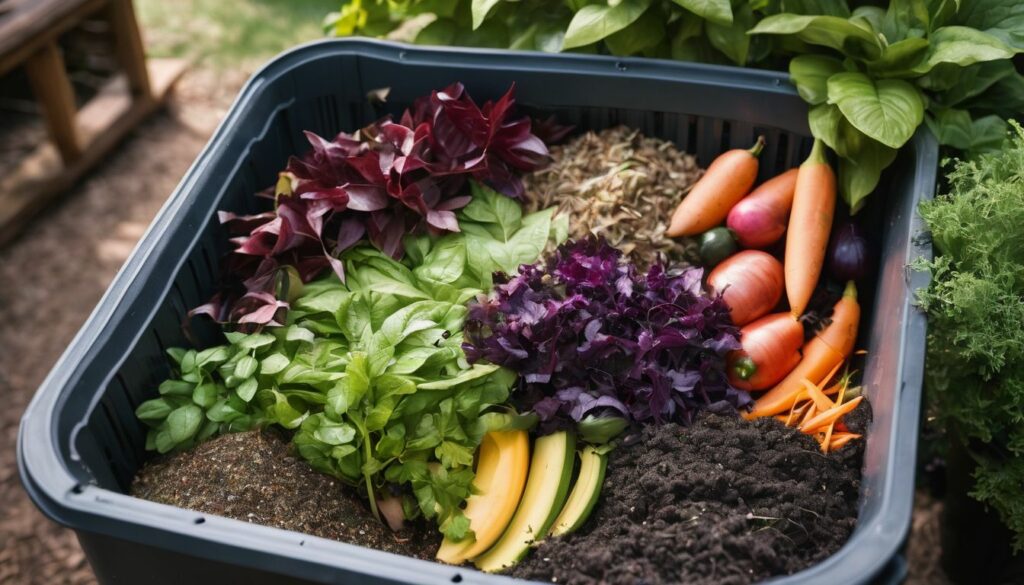Have you ever bitten into an apple and wondered where it came from, or how it was grown? You’re not alone. In a world that’s becoming highly conscious of health and the environment, more people are asking about the origins of their food.
Organic farming might just be the answer they are looking for.
Did you know that organic farmers nourish their crops using natural materials? That means no scary chemicals! This post will dive into why turning to nature can give us better food and a happier planet.
By reading on, you’ll learn all about the wonderful world of organic farming—its history, benefits, practices, and what it means for our future. Ready to dig in? Follow along as we uncover nature’s way of providing wholesome goodness!
Key Takeaways
- Organic farming uses natural methods and materials, avoiding synthetic chemicals to grow food, leading to higher quality and safer products for consumers.
- This sustainable farming practice benefits the environment by reducing carbon emissions, promoting soil conservation and biodiversity preservation, and supporting fair labor standards while contributing to economic growth in developing countries.
- Key organic farming practices include prioritizing soil health and management without synthetic fertilizers, employing natural pest and weed control methods, as well as emphasizing ethical and sustainable livestock management.
The History of Organic Farming
Organic farming has a long history, with the term “organic” first being used in the early 20th century to describe farming practices that focused on natural and sustainable methods.
These practices have since evolved and developed into standardized regulations and methods for organic farming around the world.
Terminology and regulation
People started calling this way of growing food “organic farming” because it uses natural methods and materials. It means farmers avoid synthetic chemicals to boost plant growth or kill bugs that harm crops.
Instead, they use things like compost, green manure, and friendly insects to keep plants healthy.
For organic foods to be sold in stores, farms must follow strict rules. These rules make sure everything is grown without harmful chemicals. A group checks the farms regularly to see if they are following all the steps correctly.
Only then can the food get an “organic certification,” a special label that tells shoppers the food was grown in a safe and earth-friendly way.
Development of organic farming methods
Organic farming methods have evolved over time, embracing sustainable and eco-friendly practices. Farmers employ techniques such as crop rotation, companion planting, and the use of organic fertilizers to promote soil health and biodiversity.
These methods focus on natural pest control and weed management, reducing reliance on synthetic pesticides. Additionally, livestock management in organic farming emphasizes animal welfare and natural behaviors.
Through ongoing research and innovation, these methods continue to advance for a more sustainable agricultural future.
Growth and distribution around the world
As organic farming methods continue to advance and evolve, its growth and distribution are expanding worldwide. This agricultural practice has gained popularity in various regions across the globe, with an increasing number of farmers adopting organic techniques to cultivate their crops and raise livestock.
The distribution of organic products has also become more widespread, reaching consumers in both developed and developing countries. As consumers become more conscious of environmental conservation and food safety, the demand for organically grown produce continues to rise, prompting further growth of this sustainable farming method on a global scale.
The expansion of organic farming is fueled by the increasing awareness of its benefits for both the environment and personal health as well as its potential to support local economies.
Benefits of Organic Farming
– Organic farming benefits the environment by reducing carbon emissions and minimizing pollution from synthetic pesticides and fertilizers.
– Consumers can enjoy higher quality, safer food products that are free from harmful chemical residues.
– Soil conservation and biodiversity preservation are promoted through organic farming practices.
– Labor standards in organic farming provide fair wages and support for developing countries.
Environmental impact and emissions
Organic farming has a positive environmental impact by reducing the use of synthetic fertilizers and pesticides. This helps in preserving biodiversity, promoting healthier soil, and preventing water pollution.
Organic farming also leads to lower greenhouse gas emissions and energy conservation due to reduced dependence on non-renewable resources.
Moreover, organic agriculture supports sustainable practices that benefit the environment, such as crop rotation and intercropping. These methods help maintain soil fertility, reduce erosion, and contribute to overall ecosystem resilience.
Food quality and safety
Organic farming ensures food quality and safety by avoiding the use of synthetic chemicals and pesticides, which can leave residues on produce. This means that organic fruits, vegetables, and grains are healthier for consumption as they contain fewer harmful substances.
Furthermore, organic livestock is raised without antibiotics or growth hormones, ensuring that meat and dairy products are free from these potentially harmful additives.
Additionally, remember that organic farming practices also contribute to overall food safety by reducing the risk of environmental contamination from chemical runoff or leaching into water sources.
Soil conservation and biodiversity
Moving from the concerns of food quality and safety to the vital topic of soil conservation and biodiversity, organic farming practices play a crucial role in maintaining the health of our soils and preserving biodiversity.
By utilizing natural fertilizers and avoiding harmful chemicals, organic farming helps in retaining soil fertility while also reducing erosion. This sustainable approach protects the delicate balance of ecosystems, allowing diverse organisms such as beneficial insects, birds, and microorganisms to thrive within agricultural landscapes.
Through methods like crop rotation, intercropping, and conservation tillage, organic farming enhances soil structure which improves water retention and reduces nutrient runoff. These practices contribute to healthier soils that support a rich variety of plant species while promoting biodiversity within farmlands.
Labor standards and support for developing countries
Soil conservation and biodiversity are essential aspects of organic farming, but it’s also crucial to consider the labor standards and support for developing countries. Organic farming promotes fair labor practices by providing safe working conditions, fair wages, and workers’ rights protection.
It also supports developing countries by offering opportunities for economic growth, sustainable agriculture, and access to international markets. Through organic certification programs and agricultural training initiatives, developing nations can benefit from increased employment opportunities and improved livelihoods while contributing to global sustainability.
Furthermore, the emphasis on community involvement in organic farming provides a platform for local empowerment and skill development within developing countries. This approach fosters self-sufficiency and autonomy while promoting environmental stewardship.
Organic Farming Practices
– Soil health and management are key components of organic farming practices, focusing on building and maintaining nutrient-rich soil without the use of synthetic fertilizers.
Soil health and management
Organic farming prioritizes soil health and management to ensure sustainable and productive agricultural practices. Here are some key aspects of soil health and management in organic farming:
- Organic farming promotes soil fertility through the use of natural fertilizers such as compost, manure, and cover crops, avoiding synthetic chemicals that can harm the soil and surrounding ecosystem.
- Crop rotation is a common practice in organic farming to improve soil structure, enhance nutrient cycling, and reduce the risk of pests and diseases.
- Conservation tillage techniques are employed to minimize soil disturbance, preserve beneficial microorganisms, and prevent erosion, contributing to long-term soil health.
- Organic farmers emphasize maintaining proper pH levels in the soil to support optimal nutrient uptake by plants, ensuring healthy growth and high-quality produce.
- Soil biodiversity is encouraged through the use of diverse cropping systems, which promote beneficial microbial activity and enhance overall soil resilience.
Pest and weed control
Organic farming practices emphasize natural pest and weed control methods to maintain crop health and yield. This includes:
- Crop rotation and diversification to disrupt pest life cycles and reduce weed competition, promoting overall soil health.
- Use of natural predators, such as ladybugs or spiders, to keep pest populations in check without harming the environment or other beneficial organisms.
- Mulching with organic materials like straw or wood chips to suppress weed growth while retaining soil moisture and nutrients.
- Employing mechanical cultivation techniques, such as tractor-mounted tools or hand labor, for weed removal instead of chemical herbicides.
- Utilizing cover crops and intercropping techniques to outcompete weeds and provide habitat for beneficial insects that control pests naturally.
Livestock management
After discussing pest and weed control, another crucial aspect of organic farming is livestock management. This involves the ethical and sustainable care of animals raised for food production. Here are some key aspects to consider:
- Animal welfare is a top priority in organic farming, ensuring that livestock are raised in humane conditions with access to open spaces and natural behaviors.
- Organic standards prohibit the routine use of antibiotics and growth hormones in livestock, promoting healthier animals and reducing the risk of antibiotic resistance in humans.
- Grazing management is emphasized, allowing livestock to feed on natural pasture and supporting biodiversity in agricultural landscapes.
- Feed for organic livestock must be grown without synthetic pesticides or chemical fertilizers, contributing to the overall natural integrity of the farming system.
- Organic practices promote rotational grazing, which enhances soil fertility, reduces erosion, and maximizes pasture productivity while allowing land to rest between grazing periods.
- Emphasis is placed on disease prevention through good nutrition, clean housing, and proper hygiene practices rather than relying heavily on pharmaceutical interventions.
- Livestock waste management is carefully handled to minimize environmental impact, with an emphasis on recycling nutrients back into the farm’s ecosystem through composting and manure management.
- Organic certification requires farmers to maintain detailed records of their livestock management practices to ensure compliance with standards and traceability throughout the supply chain.
- Embracing holistic approaches, organic livestock management aims for symbiotic relationships between animals, plants, soil health, and overall farm sustainability.
- The integration of animals within organic farming systems contributes to soil fertility, biological pest control, nutrient cycling, and diversified farm income streams.
The Impact of Organic Farming
NIFA’s role in supporting organic research and current events in the organic industry showcase the positive impact of organic farming practices on environmental sustainability and food quality.
NIFA’s role in supporting organic research
NIFA plays a crucial role in advancing organic research by providing funding and resources to support sustainable agricultural practices. Through grants and programs, NIFA encourages scientific innovation and the development of organic farming methods that promote soil health, biodiversity, and environmental sustainability.
Furthermore, NIFA’s initiatives aim to address the challenges faced by organic farmers while also promoting the adoption of regenerative farming techniques. By supporting organic research, NIFA contributes to the continued growth and success of the organic industry, ultimately benefiting both producers and consumers.
Moving forward to explore how success stories and current events are shaping the landscape of organic farming..
Success stories and current events in the organic industry
NIFA, which plays a significant role in supporting organic research, has seen remarkable successes and developments in the organic industry. Across various parts of the world, there are inspiring success stories of small-scale farmers transitioning to organic methods and experiencing improved soil health, increased biodiversity, and enhanced community well-being.
Moreover, current events showcase a growing consumer demand for organic products, leading to an expansion of organic farming practices and an increasing number of certified organic operations globally.
These trends not only reflect the positive impact of organic farming on environmental sustainability but also demonstrate its potential to shape a more conscientious and health-focused agricultural future.
The future of organic farming and its potential impact on the world.
The future of organic farming holds great potential to positively impact the world. As awareness about environmental sustainability and health-conscious choices increases, more consumers are seeking organic products.
This trend is expected to continue, leading to a greater demand for organic farming practices. Additionally, advancements in technology and agricultural methods will further improve the efficiency and productivity of organic farming, making it a more viable option for meeting the global demand for food while minimizing environmental impact.
Furthermore, the potential impact of widespread adoption of organic farming includes reduced chemical usage, improved soil health, enhanced biodiversity, and mitigated climate change effects.
These factors contribute to a healthier environment and better public health outcomes on a global scale. With increasing support from governments and organizations promoting sustainable agriculture, the future looks bright for organic farming as a significant contributor to addressing food security challenges while safeguarding natural resources.
Conclusion
In conclusion, organic farming offers numerous benefits and practices that contribute to environmental sustainability and the production of high-quality food. These strategies are practical, easy to implement, and have a positive impact on our health and well-being.
How can we apply these methods in our own lives to promote a healthier environment? By embracing organic farming practices, we can make significant improvements in ecological preservation and food safety.
Explore additional resources or guidance available in your area to advance your understanding of organic farming. Let’s take action towards sustainable agriculture for a healthier future!
FAQs
1. What is organic farming?
Organic farming is a way of growing food without using man-made chemicals. It’s about using natural methods and fertilizers from organic sources to help crops grow.
2. Why is organic farming important?
Ecological and biological farming are important because they keep the earth healthy. They don’t harm the land with chemicals, so it’s better for people and animals who live around farms.
3. How do farmers do organic farming?
Farmers use practices like agroecology and permaculture in organic farming. They use things like compost, animal poop, and natural ways to control pests instead of chemical stuff.
4. Has organic farming been around a long time?
Yes! Organic or chemical-free farming has a long history. People have been growing food this way for thousands of years before they made synthetic stuff to put on crops.





